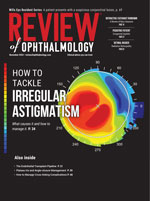
Jeffrey Gilbard knew he wanted to become an ophthalmologist the moment he saw cataract surgery being performed, and his life's work was dedicated to making contributions to the field. The untimely loss of such a visionary and highly esteemed colleague will long be felt throughout the ophthalmic community, and I wish to impart my deepest sympathy to his wife, three children and two brothers for their loss.
Attending medical school at
His brilliant contributions to the field make the title "The Father of Tear Hy-perosmolarity" a fitting distinction. As early as his second year of medical school, Dr. Gilbard made significant advances in the discipline that altered the course of research. He realized the connection between dry-eye pathophysiology and enhanced evaporation that leads to the hypertonicity of tears; an idea that we take for granted today but which was revolutionary at the time. This concept led to his development of HypoTears, perhaps the most widely accepted tear substitute in the 1970s and 80s, which ushered in a new era of dry-eye treatment.
At the same time, Dr. Gilbard recognized that dry eye was a much deeper issue than hypertonicity, and he developed TheraTears—a physiologically balanced electrolyte solution—to combat the disease further. In 1995, he founded Advanced Vision Research, a successful company still at the forefront of dry-eye drug development today. He went on to develop the over-the-counter nutritional supplements TheraTears Nutrition, Macutrition and NutriDox, which contain nutrients to promote ocular health. At Advanced Vision Research, he oversaw the marketing and placement of his drugs and led them to rival the shelf space allotted for multinational companies. Another of Dr. Gilbard's contributions to the ophthalmic community is a method for measuring tear osmolarity in situ that's in development.
Ophthalmology will long remember Dr. Gilbard and hold him in high regard, and patients will reap the benefits of his contributions to the field for years to come.



